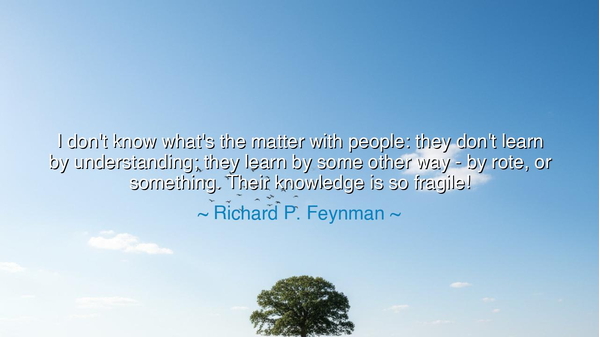
I don't know what's the matter with people: they don't learn by
I don't know what's the matter with people: they don't learn by understanding; they learn by some other way - by rote, or something. Their knowledge is so fragile!






“I don't know what's the matter with people: they don't learn by understanding; they learn by some other way — by rote, or something. Their knowledge is so fragile!” — Richard P. Feynman
In this piercing lament, Richard P. Feynman, the great physicist and philosopher of reason, speaks not only as a man of science but as a guardian of truth. His words are both a warning and a plea — that true knowledge must be built upon understanding, not memorization; upon insight, not imitation. He saw in the hearts of many students and scholars the illusion of learning — a surface glitter of facts without the foundation of comprehension. Such fragile knowledge, he warns, crumbles under the first test of experience, for it was never alive to begin with. To understand, in Feynman’s eyes, was to breathe life into what one knows — to see not merely the words of truth, but the reason they are true.
The origin of this wisdom can be found in Feynman’s own life as a teacher and thinker. He was not content merely to know; he sought to see into the heart of reality. When he spoke of understanding, he meant the kind that binds together observation, logic, and intuition — the comprehension that allows one to rebuild knowledge from first principles, even if all memory were erased. He saw, with both sorrow and clarity, that much of what passes for learning in the world is mere mimicry. Students recite formulas they do not grasp, repeat ideas they have not tested, and chase prestige rather than truth. Feynman, like a modern Socrates, sought to strip away this vanity and remind humanity that true wisdom is not what you can repeat, but what you can recreate in your own mind.
To learn by understanding is to learn as nature teaches — through curiosity, exploration, and discovery. It is to see not only the shape of things but their essence. A child who asks why the sky is blue may understand more of the universe than the scholar who has memorized a thousand pages on optics but never wondered at the heavens. Feynman often told of how he could spot those who had memorized without understanding: they could recite definitions perfectly but faltered when asked to apply them. Their knowledge was like glass — clear but brittle, shattering under pressure. Real understanding, however, is like steel — flexible, forged by struggle, and strengthened by reflection.
Consider the story of Leonardo da Vinci, who, centuries before Feynman, embodied this same spirit of understanding. Leonardo did not learn by rote, for there were few books that could teach him. Instead, he learned by seeing, by experimenting, by thinking. He dissected corpses to understand anatomy, studied the flight of birds to imagine machines that could soar, and observed water flowing from fountains to grasp the laws of motion. His knowledge was not fragile because it was rooted in observation and reason. When others memorized the wisdom of the ancients, he created his own — proof that to learn with one’s own eyes and mind is to build knowledge that endures.
Feynman’s lament, then, is not a condemnation of learning itself, but of the shallow way humanity often approaches it. He saw that education, in its hurry to produce results, often neglects wonder — the spark that ignites real inquiry. True understanding requires humility: the willingness to admit, “I do not yet know.” It is built not by memorizing answers, but by wrestling with questions. Those who truly learn do not fear confusion; they cherish it as the beginning of clarity. The wise seek not the comfort of certainty, but the strength of comprehension.
Yet, Feynman also offers hope — for understanding is not beyond reach. He believed that anyone, no matter how humble their beginning, could learn deeply if they approached knowledge with honesty and curiosity. “If you can’t explain it simply,” he said elsewhere, “you don’t understand it well enough.” Thus, one should always test knowledge — by teaching it, by applying it, by questioning it. Knowledge that survives this fire becomes real, sturdy, alive. The rest — the memorized and the unexamined — will fade like smoke in the wind.
Therefore, dear seeker, let this truth dwell in your heart: do not be content to know — strive to understand. When you study, ask why; when you believe, ask how; when you read, seek not just the words but the meaning beneath them. Let curiosity be your teacher and truth your goal. Build your knowledge upon reason, not repetition; upon insight, not imitation. For the mind that understands cannot be shaken, while the mind that only remembers is forever fragile.
And so, remember the wisdom of Feynman: “Their knowledge is so fragile.” Do not let yours be so. Strengthen it through inquiry, humility, and the courage to think for yourself. For the greatest minds are not those who know the most, but those who understand most deeply. Seek to become such a mind — unshaken, enduring, and filled with the living fire of understanding.






AAdministratorAdministrator
Welcome, honored guests. Please leave a comment, we will respond soon